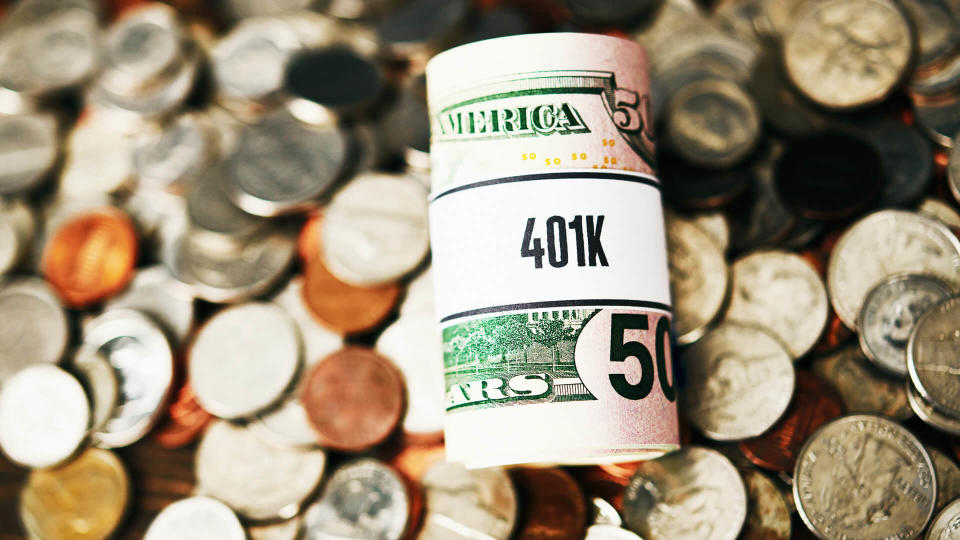What To Do If You Borrowed Money From Your 401(k) in 2020

The raging coronavirus pandemic in 2020 forced many Americans to do something they likely never thought they’d have to: take a loan from their 401(k) plan. In fact, recognizing the economic devastation brought by the pandemic, the IRS actually expanded the use of 401(k) loans. Whereas traditionally you can only borrow the lower of $50,000 or 50% of your vested 401(k) balance, for a portion of 2020, those limits were raised to $100,000 and 100%, respectively.
Read More: Should I Contribute to My 401k or Pay Off My Credit Card Debt?
If you are one of the Americans who took out a 401(k) loan, you might be wondering what the next steps are. Here’s a brief overview of the things you should be aware of regarding your loan, along with a few tips on what to avoid.
Last updated: April 21, 2021

Understand Your Repayment Terms
When you take out a 401(k) loan, it might feel like you’re simply taking money out of your account or borrowing from yourself. But a 401(k) loan is a real loan, meaning that you’ll have a monthly payment schedule, a stated interest rate and a loan maturity date.
Fortunately, most 401(k) administrators make the process fairly easy and straightforward, meaning you’ll be made aware of all of the terms of your loan, with automatic payments established. However, you should understand when your loan comes due, the amount of your monthly payment, how much interest you’re paying and the penalties involved if you fail to meet your obligations.
Although it may feel like you’re simply taking money out of your own emergency fund or bank account, there are actually a lot of rules attached to your 401(k) loan, and you should learn and understand them all.
Read More: 27 Best Strategies To Get the Most Out of Your 401(k)

Hang On to Your Job
Obviously, everyone wants to keep their job, especially during a period of high unemployment. But if you’ve taken out a 401(k) loan, it’s absolutely critical that you don’t lose your job if you want to avoid a big financial hassle. While most 401(k) plan loans can have maturities of up to five years, if you leave your job for any reason, you may have to repay your loan in a hurry.
IRS regulations require repayment of 401(k) loan balances by tax filing day the year after you leave your job. So, if you’re laid off in October 2020, for example, you’ll have to pay back your loan no later than April 15, 2021. If you fail to pay back your loan, it will be treated as a distribution. This means that you’ll owe income tax on the entire outstanding balance of your loan, in addition to a potential 10% early withdrawal penalty if you are younger than age 55.
Find Out: 6 Career Mistakes To Avoid During an Economic Downturn

Make Extra Payments
Just because your 401(k) loan has a five-year term with modest monthly payments doesn’t mean you can’t pay off your loan faster. In fact, that could be a prudent financial move. As with any standard loan, the faster you pay off your 401(k) loan, the less you’ll pay in interest. Plus, making extra payments on a 401(k) loan provides a huge additional benefit — the sooner you can pay off your loan, the faster those payments can be used instead to build your retirement account.
Did You Know: Jaw-Dropping Stats About the State of Retirement in America

Understand How the Interest Charges Work
One of the main distinctions between a 401(k) loan and other types of loans is that you pay the interest to your own account, rather than to a bank or other financial institution. In that sense, taking out a 401(k) loan might not seem so bad, since you essentially keep that interest rather than paying it out to someone else. However, there’s a huge catch. The interest you pay back to your account is with after-tax dollars. When you withdraw it from your 401(k) in retirement, you’ll pay tax on your entire distribution, including the interest you paid back to your own account. Thus, you’ll end up being taxed twice on those same dollars. This makes a 401(k) loan an inefficient use of your money.
Find Out: 30 Greatest Threats to Your Retirement

Maintain Your Investment Plan
An important thing to remember if you take out a 401(k) loan is that your long-term retirement objectives have not changed. Just because you take out a loan doesn’t mean you need to reduce the risk in your investment portfolio. Rather, you should maintain your original asset allocation in your 401(k). As it may take you five years to pay off your 401(k) loan, moving your assets to cash would mean that you’re essentially skipping out on five years of investment gains. This is an eternity in terms of compounding gains and may be enough to keep you from reaching your long-term retirement goals. Avoid this temptation and keep investing as if you had no loan at all.
More From GOBankingRates
Money’s Most Influential: Where Do Americans Get Their Financial Advice?
‘Rich Dad Poor Dad’ Author Robert Kiyosaki: You Should Never Say ‘I Can’t Afford That’
This article originally appeared on GOBankingRates.com: What To Do If You Borrowed Money From Your 401(k) in 2020
